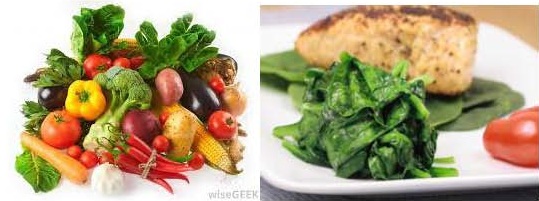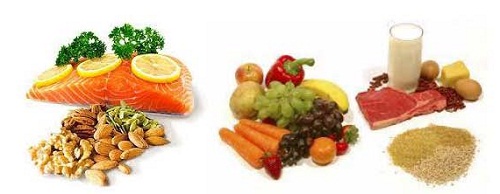Introduction
Just as your bones need calcium to stay healthy and strong, your eyes also needs specific nutrient to maintain proper retinal function and support overall eye health. Don’t wait until the aging process is begun, because in order to get healthy eye it should be started since pregnancy period. Nutrition for the eyes remains healthy is a balanced nutritional intake while priority food sources are colored green, yellow and red. This is because the food is rich in Lutein and Zeaxanthin as well as vitamin and mineral which proved great for optimal eye health.
What Is A “Healthy Diet” For Good Vision?
According to the Dietary Guidelines for Americans developed by the U.S. Department of Health and Human Services and the Department of Agriculture, a healthful diet means:
- Emphasizes fruits, vegetables, whole grains and fat-free or low-fat milk and milk products.
- Includes lean meats, poultry, fish, beans, eggs and nuts.
- Is low in saturated fats, trans fats, cholesterol, salt (sodium) and added sugars.
Results from the AREDS (The Age-Related Eye Disease study) by National Eye Institute showed that a combination of high levels of antioxidant vitamins A, C and E (in combination with the mineral zinc) significantly reduces the risk of macular degeneration and cataract. There are four main problems of eye disease at high risk for suffering from vitamin deficiency:
- Cataract
- Macular Degeneration
- Dry Eye
- Bruising around the eye

Figure 1: Example of the vision for the disorder Macular Degeneration and Cataracts
What Is Lutein And Zeaxanthin?
Carrots, vegetables and fruits orange-yellow in color are often said to be very good for eye health. Why? This is because Lutein and Zeaxanthin are natural pigments found in green vegetables, fruits, corns and egg yolks which give color. It provides nutrients to the eyes by acting as an antioxidant that prevents from harmful free radicals. 
Source : http://www.wisegeek.org/what-are-the-differences-between-fruits-and-vegetables.htm#group-of-fruits-and-vegetables
Set Of Nutrition For Healthy Eye
To prevent eye disease that has risk of blindness, our eyes need vitamins and supplements such as:
- Vitamin A and Beta-carotene
- Vitamin B complex
- Vitamin C, D dan E
- Lutein and zeaxanthin
- Antioxidant
- Omega-3 essential Fatty acid

Below Is The List Of Vitamins Needed By The Eyes:
- Protein
Protein is the basic ingredient needed for nutrition, growth and repair processes of the body. Protein also plays a big role on the metabolism and processing of chemicals and enzymes that occur in the body.
- Calcium
Calcium-rich foods are also good for the eyes because calcium works to eliminate ocular tension. Legumes and soy products, dairy products, fish, shrimp, squid, walnuts, mushrooms and lotus seed is between a diet rich in calcium.
- Vitamin A
Vitamin A is good for dealing with various types of eye problems, including lack of clarity of vision problems during darkness or dim. Foods rich in vitamin A include fish oil, carrots, eggs, cheese, butter, milk, green vegetables and orange.
- Vitamin B
Vitamin B complex is needed to ensure that the eyes remain healthy. Lack of vitamin B2 can cause red eyes, a burning sensation, cataract problems and sensitive to bright light. Meals can be taken is as cereals, wheat and yeast extract.
- Vitamin C
Vitamin C is believed to prevent the eyes from cataracts and glaucoma. Found healthy eyes contain a lot of vitamin C. Some foods rich in vitamin C include citrus fruits, tomatoes, green leafy vegetables and potatoes.
- Vitamin E
This vitamin is needed to prevent cataracts. It helps nourish the blood vessels and the retina. Sources are vegetable oils, wheat bread, cereals, and green vegetables.
- Zinc
Zinc is necessary for the retina to function properly. Zinc is also needed for the production of vitamin A from the liver to be used by the eye. Foods rich in zinc include red meat, beans, sardines, liver, and shellfish. To complement a healthy diet every day, we are advisable to take the five groups of foods below in daily routine diet:
- Leafy Green: Best natural food sources for Lutein and Zexanthin which also contains Vitamin C, Vitamin E, beta-carotene which is high in minerals and fiber.
- Egg: Egg yolks are a major source of Lutein and Zeaxanthin and provide an alternative to the less favored greens
- Citrus And Berries: These fruits are powerhouses of vitamin C
- Almonds: They’re filled with vitamin E, which slows macular degeneration. One handful (an ounce) provides about half of your daily dose of E.
- Fatty Fish: Tuna, salmon, mackerel, anchovies and trout are rich in DHA; a fatty acid found in retina. Low levels of fatty acid have been linked to dry eye syndrome.
However, it’s common that most of us don’t eat enough fruits, vegetables and other nutrient-rich foods. Despites, we consume high-calorie and low-nutrient alternatives that can be harmful to the body, including the eyes. Taking a daily multivitamin and mineral supplement can help fill in the nutritional gaps in a less-than-optimal diet and may help protect you from degenerative diseases, including eye diseases such as macular degeneration and cataracts.
Tips And Precautions When Buying Eye Supplements
- Safe and beneficial
- Read their labels carefully
- Follow these guidelines
- Do not exceed the dosage
- Seek for your doctor’s opinion if you are pregnant or nursing or are taking anti-coagulants
- Taking too much of supplement can cause problems, especially if you are taking prescription medications for health problems.
Conclusions
Eye care is very important especially in the early stages of the development of the eye. Therefore, parents play an important role and responsibility in their children eye care. Eye care starts with daily food intake. Early awareness is essential to ensure a healthy eating habit that continue throughout the life. Hence, prevention is better than cure.
References
- 5 Foods for Healthy Eyes from Health Magazine. Retrieved from http://www.health.com/health/gallery/0,,20680738,00.html
- Maintaining Healthy Eyes. Retreived from http://www.bausch.com/vision-and-age/40s-and-50s-eyes/40s-50s-eye-health/
- Makanan Untuk Mata Sihat (2012, Okt 30) http://pama.karangkraf.com/kanak-kanak/makanan-untuk-mata-sihat-1.99010
- Victor R. Preedy (2014, May 6). Handbook of Nutrition, Diet and the Eye. Retreived from http://www.amazon.com/Handbook-Nutrition-Diet-Victor-Preedy/dp/0124017177
- Laurie Capogna and Barbara Pelletier (2011, Jan 1) Eyefoods: A Food Plan for Healthy Eyes. Retreived from http://www.amazon.com/Eyefoods-Food-Plan-Healthy-Eyes/dp/0986807923
| Last Reviewed | : | 21 November 2014 |
| Writer | : | Pn. Fadhliah Bt. Husin |
| Translator | : | Pn. Fadhliah Bt. Husin |
| Accreditor | : | Pn. Nor Azizah Bt. Ismail |







